Brett Gotcher
Brett Gotcher

(c) Copyright - 2010 - Christopher Kelsall
Brett Gotcher has gone from regular fast guy with Olympic dreams and a part time job to regular fast guy who is spending his post-marathon recovery time answering more questions about his training (in one week) than he has had to his entire life - maybe. And all he did was run a marathon. Mind you it was the fourth fastest debut marathon in US history, 2:10:36. Not too shabby for a surfer-dude from Aptos California.
Leading up to the Chevron Houston Marathon, Brett ran equally well when he won the National 20km Championships in September 2009 (58:57) and in the Aramco Houston Half Marathon (62:09) in January 2009. However, marathon running is risky business and getting everything to go just right on race day is a task requiring all the right moves, patience and a little good fortune – kind of like surfing – well maybe not exactly. Coach Greg McMillan is there to help guide the way, complimenting his blossoming talent and helping to foster Brett’s strong commitment to achieve more.
Brett took the time to answer a few more questions, exhibiting that rare level of patience successful marathon runners possess. Here is our interview.
Christopher Kelsall: Brett, Congratulations on running the 4th fastest debut marathon in US history, with your 2:10:36.
You said that you just completely died in the final 2 miles otherwise you would have gone sub 2:10:00. In reflection do you feel you went out a little fast or could you have used another over-distance long run?
Brett Gotcher: Thanks a lot Christopher. I did indeed have a rough last 2 miles or so and before that happened, I was very confident that I was going to break 2:10. I had felt really good almost the entire way and thought that if I could just finish it off, I would be able to dip under. I'm not exactly sure what caused the breakdown over the final 2 miles, but what I learned from this experience is that there are so many different variables in a marathon. So many things need to go right, and so many things can go wrong. I think I went in well prepared to run that kind of a pace, and lucky for me, I had more things go right than wrong.
CK: Greg McMillan's calculator indicates that your 20k, half-marathon and marathon times are very close in performance standard to each other. Once you ran the 20k National Championships in 58:57, did visions of sub-2:10 go through your mind at that time?
BG: Greg told me at the beginning of 2009 that he thought I would be able to run under 2:10, but I don't think I actually started to believe him until after the 20k and once we got going with the marathon training. I really had to put all my trust in him because I had no idea what the marathon was all about, but he's been pretty dead-on with predicting what I'm capable of. The man knows his stuff.
Greg
"One of our mantras is "Be open to greatness." Brett has embraced it, but it took a year before he was willing to really run to his potential. The Houston Half-Marathon last year was when he returned to the mindset that made him a great high school runner. He "went for it" and ran what we thought he could run - 1:02. Since then, he's always been open to racing up to what I thought he could do. The marathon was no different. Many are saying it's a breakthrough, but you have to remember that we have been working toward his marathon debut for 2.5 years. And, in the training, it was clear he was in 1:01-1:01:30 half-marathon shape (He was hitting the same times that Martin Fagan was hitting before Martin ran 1:00:57 last year) and 2:09 shape for the Houston marathon.
While I know 2:10 is fast and it was a great race, we are both pleased but very unsatisfied. We know he can run much faster. (His fluid bottles were taken or knocked off the table in the critical latter stages of the race so he couldn't fuel like we hoped which caused him to slow down over the last 2 miles.) Now that he has one under his belt, we will be able to do an even better job with the training and he now has a lot of confidence that he can run a fast marathon. Any marathoner who wants to be a contender on the global scene must have his sites set on 2:06-2:07 and that's what we've always talked about. We are happy to start at 2:10 because that is a shorter jump to 2:06 than playing it safe and starting with a 2:14-2:15. That's the mindset in our group, which I think is why you see our athletes performing very, very well. I tell them they are going to do it then we put in the smart, directed work over weeks, months and years in order to do it. Then, their teammates start racing fast and it's just a snowball effect where each athlete says, "I train with him so I can do it too!" But, the foundation is that we don't set limits and are open to greatness."
CK: Goals - 2012 London Olympics and the Olympic trials are obviously going to be on your mind and in your plans. How about shorter-term goals? For the interim do you have some specific shorter distance targets to hit, like running the sub-28 you seem to be capable of?
BG: Yeah, definitely, especially with the track season coming up. I would really like to break 28:00 and 13:30 because I feel like those are two more barriers that need to be taken down. If you look at almost all the greatest distance runners in U.S. history, they all have that sub 2:10 marathon, 27:30's 10k, and 13-teens 5k. I really want to be a well-rounded runner and that means being able to run fast over almost any distance. Hopefully this spring I can take down a few more of those barriers.
The plan as of right now is to take a little time off to recover fully, and then get ready for a solid track season. Plus, it's a down year in terms of the world champs and all that stuff, so it'll be a good time to take some risks and really go for a fast one because there's nothing to lose.
CK: Regarding you having the opportunity to sit in the lead vehicle at the New York City Marathon, you wrote in your profile blog at McMillan Elite: 'I saw every move that was made, the pain on everyone’s faces, and the guts and determination it takes to win one of the biggest marathons in the world. I got to see all the pointless surges made early on and the price the people making them paid. I left with a whole new understanding of the marathon and how it should be raced...'
Now that you have raced a marathon, was that day in New York as valuable as you first thought?
BG: For sure. That day in New York taught me more about the marathon than anything else. I got to see first-hand how some of the best marathoners in the world run the race and that had a huge impact on me.
The experience helped reinforce the ideas that Greg and I already had, which was that you have to be aggressive but you have to have a plan. I kept a close eye on Meb the whole time and you could see he just looked so comfortable up there. He was out with the leaders, which was where he needed to be, but he knew exactly what he was doing and he never lost control. Then, when the time came, he made his move and dropped a 2:04 guy and a 4-time Boston champion. It all seemed so calculated. I think I was able to carry a lot of that over to my race, but I kind of lost control there towards the end. You live and you learn.
CK: Having watched Meb the whole way, how did he look in the last 2 miles?
BG: He looked amazing. You could see in his face that he was tired, as you'd expect to be, but his form never broke down. Obviously he was running strong though, because he was pulling away from Robert Cheriyout. It was how I envisioned looking and feeling at the end of my marathon, but running strong like Meb can be a harder task than you think.
Off topic
CK: After Houston, can you now ask to work a day less per-week at the copy shop?
BG: Ha ha, I've been slacking over there lately. Luckily, my boss is awesome so she'll probably cut me a break.
CK: Ok your turn on the Ladies 80s event on Wednesdays. Any good stories? Like does Greg get out of hand?
BG: Ha ha, oh man, Ladies 80's. I think every time I've gone, I've vowed to never go back. So many sweaty, stinky people (I guess that's not much different to the scene after any race), but you get my point. I'm more of the guy that likes to sit on the front porch with his dog and have a couple cold ones. I think you have to ask Marty for the good stories, that guy owns Ladies 80's.
CK: Fagan? I did, he said you are a wild man; it's in my interview with him.
BG: Ha ha, now that's just a lie. I like to consider myself one of the lamest people out there.
CK: Fagan admitted to liking Schlitz Beer because it tastes like Narragansett please don't tell me you drink Schlitz.
BG: No Schlitz for me, ha ha. I'm usually not much better though. I'm kind of a Tecate guy myself, although when I'm feeling wealthy I've been known to pick up some Fat Tire or Newcastle. We've actually become pretty good friends with the Northern Arizona New Belgium Beer Ranger (I know, coolest job ever huh), so hopefully we can work out a "sponsorship" deal with them.
CK:When I grow up, I want to be a Beer Ranger. Does Fagan have Schlitz at Ladies 80s?
BG: Probably, they're not known for carrying much of the classier stuff there. I remember when he was all about Blue Moon though. I think he just goes through phases.
CK: Current song that you can't get out of your mind, right now?
BG: Soundtrack 2 My Life - Kid Cudi
CK: Did you start listening to him through Kanye, Lady Ga Ga or was it his release, Man on the Moon, with the popular hit, Day 'n Night that got your ear?
BG: I generally try to stay away from Lady Ga Ga; she kind of freaks me out. And ever since Kanye pulled that little stunt in front of Taylor Swift, he's kind of dropped off my radar. I actually heard his (Kid Cudi) CD in Andrew Carlson's car one day and I just liked his smooth style.
CK: Eh, men! What are currently reading?
BG: Marathoning, by Bill Rodgers
CK: Preference: long and steady for 3 hours or 15-mile tempo?
BG: Long and steady, but those tempos will get ya fit!
CK: Your teams: NFL, NBA and MLB?
BG: 49ers, Warriors, Giants. I know, rough year.
CK: Owe.
Back to running
CK: Greg is all about the Arthur Lydiard method of training. Are you a bit of a student of the method now?
BG: I'm getting there. That was one of the things that I wanted to improve on. I want to become a student of the sport. I'm learning more and more each day about the Lydiard way of training, but I feel like I still have long ways to go before I fully understand what it's all about. All I know is that Greg is an expert on Lydiard training and it works!
CK: If you look at many of the Lydiard athletes, they not only had very long careers (if they chose to stick with it) and they were also world-class at a broad range of distances in road, track and cross. For example, Rod Dixon is the only athlete to run sub 4-minute mile and a 2:08 marathon. Lorraine Moller was fast from 800m to the marathon and had a 28-year international career.
I have read where you have referred to yourself as a marathoner. Long-term, are you planning to race a range of distances on road, track and cross or focus specifically on the marathon.
BG: I've actually had a lot of communication with Rod Dixon over the last few years and he has been a huge inspiration for me. We met in 2008 at this little road race I did in Santa Monica, and he has had a lasting impact on me. Greg always told me that I reminded him of Rod, and when I finally got to meet him, I was honored that I could even be mentioned in the same sentence as the guy. I think he's the perfect example of a guy that was just good at running. He never let himself get pigeonholed into a certain event and he excelled in everything from the 800m all the way to the marathon. He's played a huge part in my development as a distance runner and reinforced the ideas that I can be great in a variety of races. To have that kind of guidance is pretty special.
CK: In 2001, your high school coach Dan Gruber, referring to you in an interview said, "unlike very many runners who are fast, he has no fear of losing." You mentioned 'having to go for it' (to run a fast marathon) and in this interview, regarding racing track this spring you mentioned it will be a good time to take risks. Do you get a sense of joy or satisfaction from walking that fine line between success and failure?
BG: I mean, you never want to be on the verge of failure, but I feel like I got a good sense of what it can be like when a marathon goes bad. In order to perform at your best, you have to be able to ride that fine line. It definitely shows you that you are running your hardest, but to be honest I really like to feel good the whole way. Is that too much to ask?
But in all seriousness, Gruber really shaped the way I approach running and races. I would go into almost every race thinking I could win and trying to win. Sometimes it works out and sometimes it doesn't, but you have to give yourself that chance. You have to put yourself in a position to make it happen. That's something I think I lost when I was in college and Greg has done a great job of helping me get my mind thinking that way again.
Coach Dan Gruber
“Brett displayed several signs of long-distance ability. He had a natural rhythm and tremendous motor…. I did see a lot in him…. I have always believed in him and have seen his mindset that doesn't get intimidated when the competition gets tougher.
…I used to kid him that he should try the marathon by 2012 so I could go on a road trip to London. We still keep in touch with each other on a regular basis and have done so since he graduated. And he is a wonderful young man.”
CK: Let's talk hill work. In your marathon program, did you end up in a hill phase with bounding, drills, circuits and repeats for a few weeks?
BG: It was kind of hard to do a lot of hills during this marathon cycle because the roads were always really icy and all the dirt roads that we normally do repeats or circuits on were completely covered in snow. I was still able to get some quality ones in, but it was never really a complete hill phase. I did a lot of hill work in the late summer and early fall when I was getting ready for the 20k and World Half, so I think that set me up pretty well for the rest of the marathon training.
CK: Perhaps running in the snow helps to develop muscular strength and keeps the aerobic runs aerobic, Lydiard liked that aspect of the Finnish winters.
BG: I'm still up in the air on how I feel about running in the snow. I can see how it would help develop muscular strength because you have to work harder in order run a normal pace, but I feel like at times, I was bordering on being anaerobic because of this. If you're running flat and not at altitude, it would probably work out a little better. But up here, it got brutal at times.
CK: What sort of mental games do you play while trying to complete a 15 to 18 mile tempo or a 3-hour long steady run?
BG: I really don't mind the long steady runs we were doing, especially when you have all your teammates to run with. I was nervous about the 28-mile long run because I was back home in California for Christmas and didn't know if there would be anyone I could coax into running it with me. Luckily my high school coach and some of the boys came out and ran the last 8 miles with me, which was really helpful. I just got to listen to them yap at each other for the last hour.
Those tempos though, they're a little tougher. I'd feel great for the first 8 or 9 miles, but then it started to catch up to me. And it always seemed to hit right before I was supposed to pick up the pace. I tried all kinds of mental things along the way, but the thing that worked the best was as soon as I crossed a mile mark, I had 4.xx miles to go instead of 5 or however much was left. For some reason it just made it seem like it was going by quicker.
CK: Did you play many other sports as a kid?
BG: Yeah, for sure. I played baseball from when I was about 5 or 6 all the way to my freshman year in high school and I played basketball all the way through my junior year of high school. I also surfed as much as I could, but once running took off, it got harder and harder to get out there.
CK: When did you discover running?
BG: I started running in 8th grade. I went to a small private school from K-8, and the only sport we had was basketball. My last year there they started a cross-country team and I thought I'd give it a shot, and if nothing else get in good shape for basketball. Turned out I really enjoyed it and was pretty good, so I stuck with it.
Scroll down for comments section
Contact Chris: chriskelsall@flocasts.org
Related Content
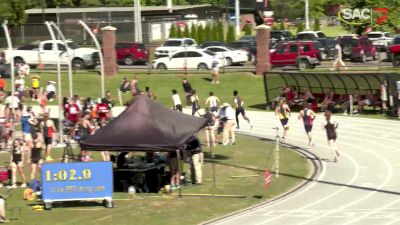 Replay: SAC Outdoor Track & Field Champions | May 1 @ 1 PM
Replay: SAC Outdoor Track & Field Champions | May 1 @ 1 PMMay 2, 2024
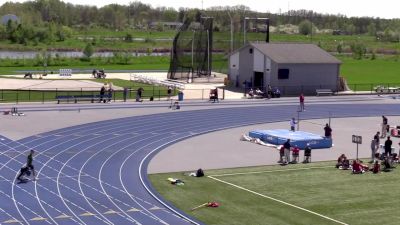 Replay: GLIAC Outdoor Track Championship | May 1 @ 1 PM
Replay: GLIAC Outdoor Track Championship | May 1 @ 1 PMMay 1, 2024
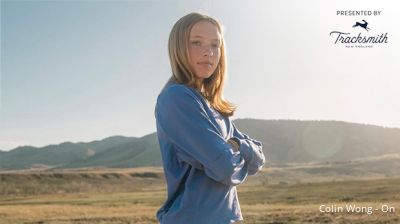 PR Of The Week presented by TrackSmith: Addison Ritzenhein
PR Of The Week presented by TrackSmith: Addison RitzenheinMay 1, 2024
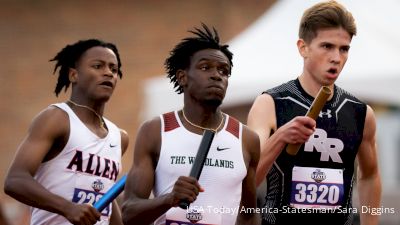 UIL Track And Field State Championships 2024: What To Know
UIL Track And Field State Championships 2024: What To KnowMay 1, 2024
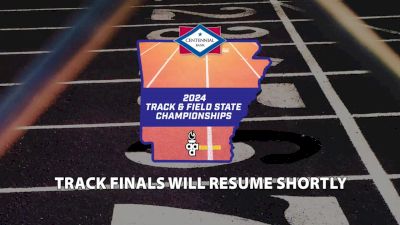 Replay: AAA Outdoor Champs | 4A | Apr 30 @ 11 AM
Replay: AAA Outdoor Champs | 4A | Apr 30 @ 11 AMMay 1, 2024
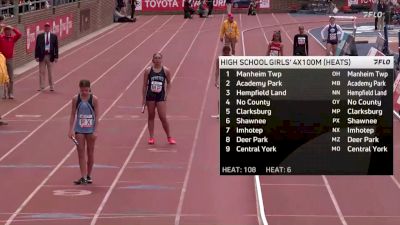 High School Girls' 4x100m Relay Event 108, Prelims 6
High School Girls' 4x100m Relay Event 108, Prelims 6May 1, 2024
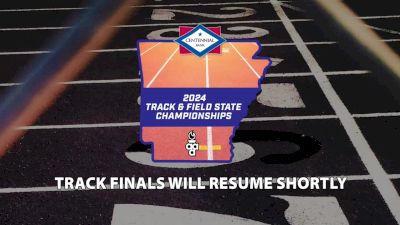 Replay: AAA Outdoor Champs | 3A | Apr 30 @ 11 AM
Replay: AAA Outdoor Champs | 3A | Apr 30 @ 11 AMMay 1, 2024
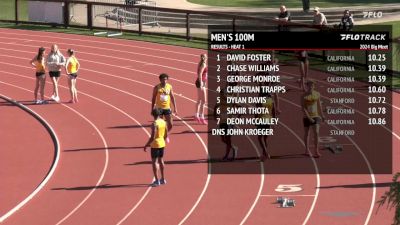 Replay: Big Meet | Apr 30 @ 3 PM
Replay: Big Meet | Apr 30 @ 3 PMMay 1, 2024
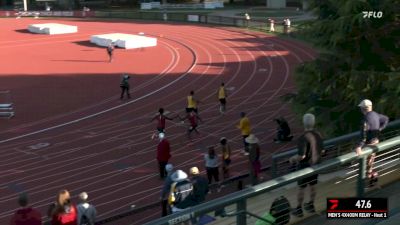 Men's 4x400m Relay
Men's 4x400m RelayMay 1, 2024



